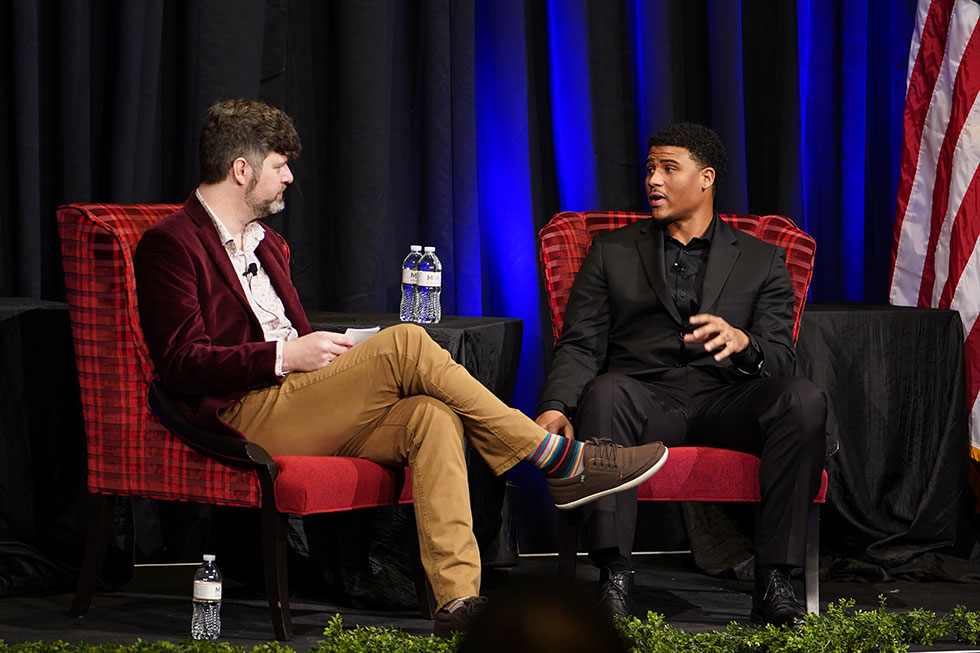“Attention is great. We have to be sure to be ready for that attention,” said Black & Mobile co-founder David Cabello, right, with Tom Kaiser, Editor of Food On Demand.
David Cabello is co-founder with his twin brother of Black & Mobile, the first food delivery service catering exclusively to Black restaurant owners. He’s appeared in a video with Jay-Z, been featured in People and Fortune magazines, and even got a call from rapper Waka Flocka looking to invest.
But he puts the attention in perspective. “You get an email from Jay-Z’s team, I couldn’t believe it. Attention is great. We have to be sure to be ready for that attention,” he said, speaking to Editor Tom Kaiser on the last day of the Food On Demand Conference in Las Vegas.
“We’ve had some celebrities calling, like Waka Flocka has called me. I’m holding off on big-time investors,” and is instead intent on growing his restaurant client base from about 120 now to more than 500. “I would be a fool not to want investment,” but it has to be right. “I’m young, I need help, so I don’t want just money.”
Cabello, whose mother helps out with the business, too, started Black & Mobile after dropping out of college and becoming a delivery driver for the big three services to earn extra cash. “I’m making a ton delivering, but I wasn’t finding any Black-owned restaurants. Most people can’t name over 10 Black-owned restaurants off the top of their head. It showed me the need,” he said.
Black & Mobile started in Philadelphia, and has expanded to Detroit, Atlanta, Baltimore, New York and Los Angeles, “L.A. two weeks ago,” he told the audience. “We’re going to pause. People want us—people want us in Africa! We have to make sure the foundation is correct.”
Matt Howard, founder of EatStreet, focuses his delivery service in four Midwestern states so far, starting in his home base of Wisconsin, in cities with populations from 50,000 to 300,000 in population. EatStreet has 15,000 restaurants as clients to date, and his next step is to add verticals.
“Our view at EatStreet is to double down on the focus on food. So not just restaurant meals delivered, but adding on convenience, groceries, alcohol. It’s not legal in Wisconsin yet, but we’re working on it,” he said about alcohol delivery.
Carl Grimstad, CEO of Waitr Holdings, is bullish on the delivery of another product with legal barriers—cannabis. “The biggest opportunity I see now is cannabis. We provide payment services for over 300 dispensaries currently. As the regulatory environment state by state evolves, you’re going to see us” go after the sector.
“You can read all the statistics. The growth in cannabis over the next five years is going to be enormous. What I like about it is, it’s super messy right now,” he added. “Until it’s federally legal, it’s going to be an opportunity because the bigger guys aren’t going to” touch it.
Linxin Wen is the founder of Chowbus, which last year attracted $33 million from investors who like its focus on serving “mom-and-pop” Asian restaurants.
“People know us as the Asian food delivery company. Asian food by category, it’s the second-largest category and also it’s the fastest-growing category,” he said, touting a tech team he calls “one of the best” in product development.
Those tech products aren’t created only for diners on the go, he said. “Chowbus mission is to really help the small Asian restaurant, and dine-in is very important. Before the pandemic, dine in was 80 percent of the revenue,” he said. “We wanted to figure out how to bring the customer” to dine in. “If you’re in the restaurant, you can scan our QR code, and then you can share your dine-in order to social media too. So people can discover this restaurant.”
The Food On Demand Conference ended today at noon. Read more coverage here.


